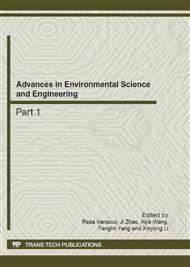p.1479
p.1492
p.1496
p.1501
p.1506
p.1510
p.1516
p.1520
p.1525
Determination of Total Hardness in Drinking Water by Microscale Chemistry Experiment
Abstract:
Total hardness is one of important index to evaluate drinking water quality. The determination method of total hardness in the drinking water using the micro titration has introduced, and also has compared the obtaining results by the microburette and by the routine analysis. The relative standard deviation is far less than 2.0%. There is no obvious difference in the results. F examination and t examination are all in the appropriate scope.
Info:
Periodical:
Pages:
1506-1509
Citation:
Online since:
May 2012
Authors:
Keywords:
Price:
Сopyright:
© 2012 Trans Tech Publications Ltd. All Rights Reserved
Share:
Citation:


